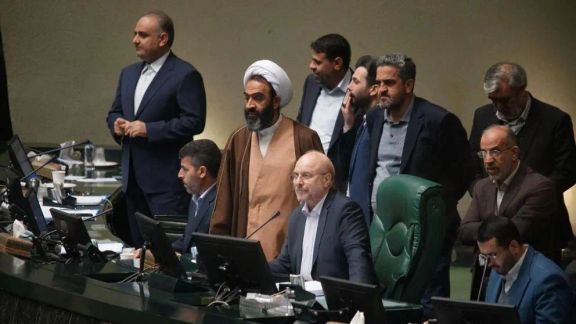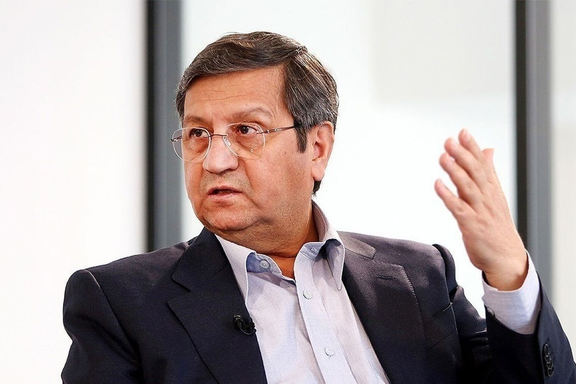Hardliners pursue impeachments as Iran's crisis deepens

Hardliners in the Iranian parliament are determined to impeach four cabinet ministers just five months after the government’s formation, during an unprecedented economic crisis.

Hardliners in the Iranian parliament are determined to impeach four cabinet ministers just five months after the government’s formation, during an unprecedented economic crisis.
The hardliners' push began last week with a motion to impeach Economy Minister Abdolnasser Hemmati. According to the conservative Nameh News website, after Speaker Mohammad Bagher Ghalibaf opposed the move, the hardliners expanded their efforts to include three additional ministers: Labor Minister Ahmad Maydari, Oil Minister Mohsen Paknejad, and Energy Minister Abas Aliabadi.
However, moderate MP Gholamreza Tajgardoon suggested on Tuesday that Speaker Ghalibaf might still manage to persuade lawmakers to withdraw the impeachment motion.
The new government was barely a month old when Iran’s already weakened currency, the rial, began to plummet in September, losing 33% of its value. This sharp decline followed a series of consecutive regional setbacks for the Islamic Republic, including significant blows dealt by Israel to Hezbollah.

The ultraconservative daily Vatan Emrooz reported that "the motion for impeachment has been submitted to the Majles Presidium despite Ghalibaf's opposition." The newspaper noted that "the number of MPs supporting the impeachment of Hemmati exceeds those seeking to unseat the other three ministers." According to the report, while the motions to impeach the other ministers have been signed by around 10 MPs each, the call to impeach Hemmati has garnered over 70 signatories.
The new additions to the list of impeachments could be a tactic by hardliners to make sure that they can unseat at least one minister to demonstrate their power. That is important for hardliner majority as they have not been able to ratify any significant legislation since entering the parliament in May 2024.
Tajgardoon, chairman of the Majles Budget Committee, commented that "the calls for impeachment are rooted in factional motivations." He suggested that hardliners might be targeting the Oil and Labor Ministers, who only narrowly secured the parliament's vote of confidence. While recognizing that the primary target of the impeachment efforts is the Economy Minister, Tajgardoon expressed hope that the motion would not lead to Hemmati's removal from the government.
The conservative Nameh News has reported that "if successful, the impeachment would bring about a significant shift in the government and is likely to escalate tensions between the cabinet and parliament."
According to Nameh News, the hardliners have justified their impeachment efforts by stating that they are targeting Hemmati for the surging exchange rates, Paknejad for failing to supply fuel to power plants, Aliabadi for recurring power outages, and Meydari for his inability to improve workers' livelihoods or reduce unemployment in Iran.
However, none of these issues are new, as the newly formed government inherited longstanding shortages and structural problems from previous administrations, compounded by years of sanctions and ineffective governance.
The Alef website suggested that the true motive behind the impeachment push might lie in the economic interests of powerful insiders. As the rial plummeted, the government restricted access to cheap dollars previously supplied to influential importers—well-connected figures within Iran. According to Alef, "Eliminating the special lower exchange rate for importers and exporters, along with requiring exporters to repatriate their hard currency earnings to Iranian banks, has fueled the impeachment effort." The website supported its claims with statements from government spokeswoman Fatemeh Mohajerani and Vice President Mohammad Reza Aref, who defended Hemmati's foreign exchange policy reforms.
Reformist media outlets, including Rouydad24, have criticized the impeachment motions, noting that they come "during severe economic and foreign policy crises in Iran," while also citing "heightened international tensions in the region." Highlighting the factional motivations behind the push to impeach Hemmati, the website questioned, "Why was former President Raisi's economy minister never impeached, even after a 120-percent rise in exchange rates?"
While Ghaibaf has branded the impeachment as a "political show by hardliners," ultraconservative media such as Vatan Emrooz say "impeachments are a way of making the government accountable."